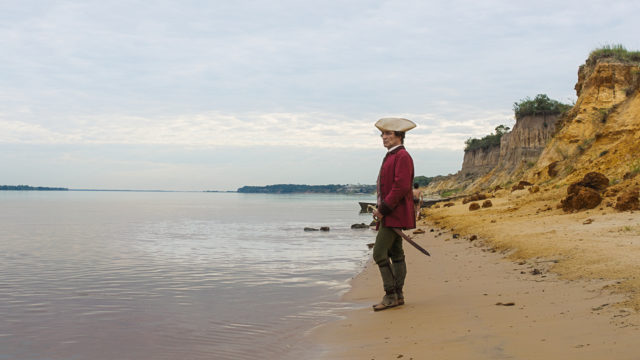
Zama — the latest from Argentinean writer/director Lucrecia Martel — opens with a parable: There is a fish, a long-suffering fish, which spends its days in the very waters that try to cast it out. The water, which does not want the fish, tries and tries to wash the fish up on dry land while the fish does everything it can to remain in the water.
A similar struggle provides the core of Zama, around which Martel wraps a historical portrait of existential despair. Working from Antonio di Benedetto’s 1957 novel of the same name, Zama is set in 17th-century Argentina and focuses on Don Diego de Zama (Daniel Giménez Cacho), a Spanish colonialist in an unnamed village waiting to be transferred to another village while slowly being worn away by the elements. Consider the movie’s opening image: Zama staring across the sea, clean white hat, pressed red coat, saber at his side; posing as if a painter is just off camera working on his profile. On the soundtrack, cicadas grind away in the sweltering heat. Zama won’t look nearly this composed in the movie’s final images, but those cicadas will still be grinding their endless song.
Suffering from the same sort of nausea that plagued Antoine Roquentin, Zama is slow to act and slower still to understand. As he waits for a transfer that will never come, Zama meanders around the village with disgust for the locals — though he’s fathered a child with one of them — and disdain for the bureaucrats who run the colony. Martel matches his plight in the movie’s pacing; life moves slowly here and information even more so. Instant gratification isn’t an option; even advances from a smoldering Luciana (Lola Dueñas) leave Zama unsatisfied.
Though Zama builds slowly, it does so assuredly. Rui Poças’s photography is particularly enchanting, especially the third act when the action moves entirely into wide-open spaces. Out here, Zama finds the man he’s been looking for, but even this discovery is just another illusion, another deceit. Finally, Zama refuses to play ball: “I do for you what no one did for me,” he says with enlightened calm. “I say no to your hopes.”
And for this brief moment, the fish accepts that the water does not want it, and surrenders to life on the sand. Not everyone is as lucky; others have little choice in the matter. Take the servants back at the village; in almost every interior scene, you can see one character in the back mechanically pushing a poll up and down or turning a crank of some kind. No doubt they are opening and closing a shutter just off camera in an attempt to create a breeze. But the bugs still zip around, sweat still pastes those awful powder wigs to Zama’s head and you can practically see the stench. And there they are, turning that crank without complaint. We must do what is asked of us, no matter how meaningless it must seem and how worthless those coconuts really are.














